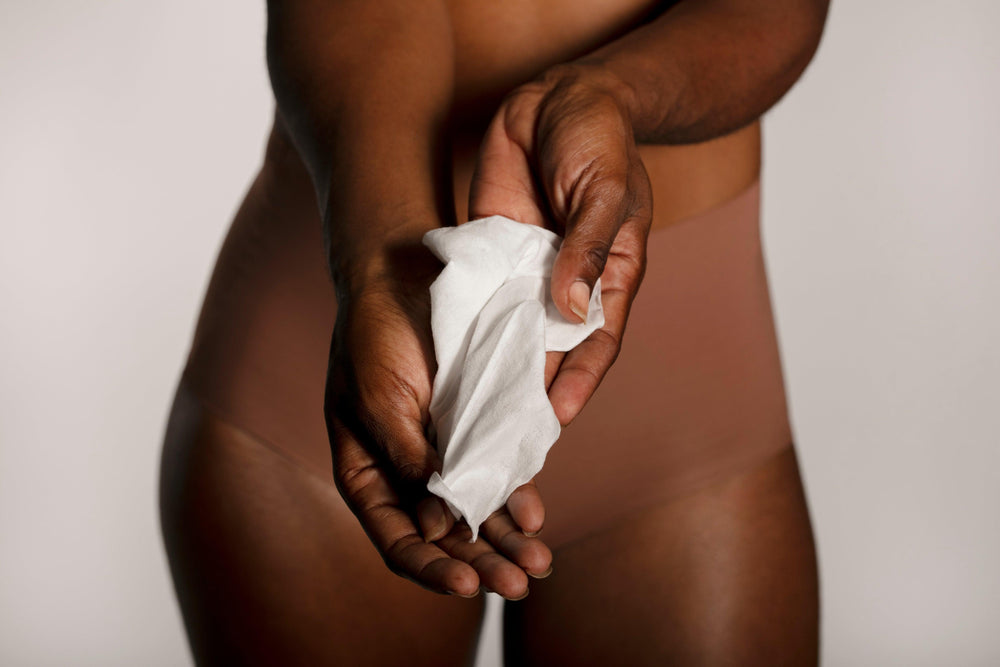In case you missed it, we’re launching our newest product right now – flushable, biodegradable flushable wipes! We are really proud of what's in them (over 99% purified water, plus dermatologically-tested organic botanicals), as much as what’s not (no dyes, parabens, chlorine bleach, sulfates, alcohol, or synthetic fragrances). So let’s talk feminine hygiene. As many women will tell you (especially those who experience bladder leakage) will tell you, wipes are the perfect complementary product to help cleanse, balance, and restore their most sensitive skin.
As we’ve prepared for this launch, we’ve been talking with women about feminine hygiene, getting a better understanding about what they are most concerned about, and tapping our resident medical advisor, Dr. Barbara Frank, OBGYN, to help shed some light on things. Barbara, as always, gave it to us straight (and we love her for it).
Q: What is the biggest misunderstanding when it comes to feminine hygiene? What are women doing wrong?
A: Yoga pants and thongs! Nothing against yoga pants, or thongs, but in general tight clothes and sweat means irritation. The goal is breathability. If you wear tight pants while working out, change them after you exercise, or at least put on fresh cotton panties! If you can’t bear the visible panty lines, it would be better to go commando. Save those thongs for date night :)
Also, don't douche. Your vagina is like a self-cleaning oven -- you do not need to intervene. Douching disrupts your vagina’s natural balance, causing more harm than good.
Also, avoid synthetic fragrances. The chemicals can irritate and throw your body’s pH out of whack.
Q: Let’s talk feminine hygiene tips -- from bladder leaks, to vaginal discharge, to blood, to vaginal sweat, what should women be considering when trying to manage feeling fresher or cleaner?
A: The most important thing is to use products that work for you. Find products that effectively wick moisture away. But keep in mind that less is more -- avoid non-essential features like dyes and fragrances that can cause irritation. With daily use of pads, you may want to consider using barrier creams to protect your skin.
Q: At the risk of being too basic, can we ask, what exactly IS vaginal discharge?
A: Vaginal discharge is composed of cervical mucus, vaginal fluids, shedding vaginal and cervical cells and bacteria - don't worry this is normal bacteria that protects us! In order for our vaginal discharge to be "normal", everything has to be in harmony. Also, discharge changes near ovulation if you are not on hormonal birth control. It becomes stickier to help sperm navigate.
Q: Many women are concerned with vaginal odor, what advice would you give them?
A: Odor is a tough one - I always ask the question, is it something that you can just smell or is it something other people notice? If you feel like you smell funny when you go to pee and you're up close and personal with your panties that is different from something that is seeping through your clothes. Also, know that the smell can change at different times of your cycle. But, of course, if the odor concerns you, or is coupled with other symptoms like itching or burning, speak openly to your doctor. It could be a sign of something else, like a yeast infection.
Q: Does a woman’s approach to feminine hygiene need to change during or after menopause?
A: Not necessarily, but keep in mind that menopause dries out the vagina, and all of the tissue around it including the vulva – that’s the labia and skin that touches your undies. Therefore, less discharge. It also thins out the tissue and makes it more fragile or prone to irritation. I recommend barrier cream to protect the skin or talking to your doctor about topical estrogen cream, which (if right for you) can be very effective at treating vaginal dryness, burning, and irritation.
Q: When we think of skin, we rarely think about the skin around women’s private parts, but it is indeed some of your most sensitive skin. What should women consider when it comes to the skin health “down there”?
A: Honestly, we forget this skin is EXTRA sensitive - things like soaps, detergents, strange fabrics, condoms, pads/liners/tampons can all irritate your skin. Even a period cup can cause skin irritation if not positioned correctly. As a rule of thumb, choose products with minimal synthetic additives and harsh chemicals. As I said before, less is sometimes more.
Q: When, if at all, would you advise women to use wipes?
A: I recommend flushable wipes for hydration, to return your skin to normal pH (like after your period or after times of irritation), or for soothing purposes. If the skin is irritated however, wipes alone might not be enough -- you may need a barrier cream.
